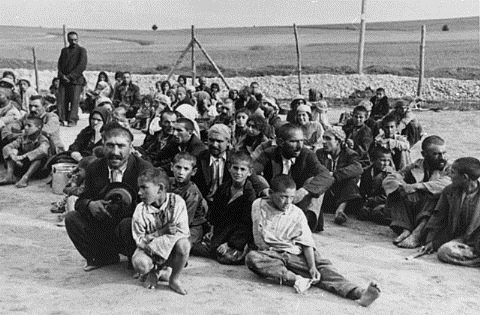



Web design and content by the 8th-grade students of Bernard Zell
A student's guide to the novel inspired by hidden history.

Overview of History:
The Roma originated from India. They are believed to have entered Europe through Persia in the 1400’s. The Roma were a nomadic group. The common name for the Roma is Gypsy. The word Gypsy can mean Nomad, a member of a people or tribe that has no permanent abode but moves about from place to place. However, many Roma consider that name, Gypsy, a slur. The Europeans devised the name Gypsy because they thought the Roma originated from Egypt. Also, in some cultures the word Gypsy means untouchable. The Roma were persecuted throughout European history. Many were slaves of Europeans until the Nation of Romania was found in 1864.
During World War II, they were persecuted throughout German-occupied Europe. The Roma, like the Jews, were interned, killed, or deported to camps. The first deportation began in the summer of 1936 when Hitler decided to clear the Roma from Berlin before the Olympic Games to protect the image of “perfect Germany.” Almost all of the German Roma were sent to Rastplatz Marzahn, a suburb of Berlin. The collaborationist regime of Vichy France interned 30,000 Roma, many of whom were later deported to Dachau, Ravensbrück, Buchenwald, and other camps. In Croatia, members of the local fascist Ustasha movement killed tens of thousands of Roma people, along with Serbs and Jews. In Romania in 1941 and 1942, thousands of Roma were expelled, alongside Jews, to Transnistria (western Ukraine) where most of the deportees died from disease, starvation, and brutal treatment. In Serbia, in the fall of 1941, German army firing squads killed almost the entire adult male Roma population, alongside most adult male Jews. In Hungary, Germans and Hungarian collaborators began deporting the Roma in October 1944.
In spite of their tortured history, many Roma have maintained their traditions and beliefs. Many live in Romania and other parts of Europe today. Most of them only share their story with their children and grandchildren and are afraid to share with people outside of their family groups. Although the Roma suffered along side the Jews and other victims of the Holocaust, many people do not recognize their sufferings. While many Jewish victims have received reparation funds, the Roma have received little, or no funds.
Relation to Train:
In the Novel Train, Tsura, Marko, and Kizzy are Romani, a sub culture of Roma. The Roma Holocaust is sometimes referred to as the forgotten Holocaust. In Train Tsura speaks of her anger towards the protesters at Rosenstrasse because they did not protested for her people. “The entire world, those Jews in America included, couldn’t care less about us Zigeuner”(280). In March 1943, around the time of the Rosenstrasse protest, as discovered by Tsura, Marko, Wolf and Seraph, the Nazis began the deportation of the Roma in Marzahn to Auschwitz.





